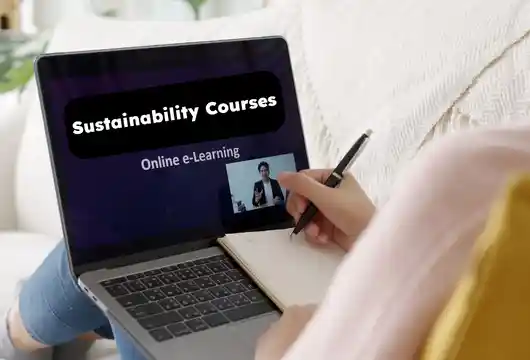Upskilling Courses for a Rewarding Career in Sustainability
Switching to a career in emerging sustainability can be rewarding and impactful. There are various upskilling courses and areas of focus that can help you make this transition successfully. Here are some key areas and courses to consider:
1. Sustainable Business and Management: Understanding the principles of sustainable business practices and management is crucial in the sustainability field. A course in GHG Accounting or ESG Reporting comes in handy.
2. Renewable Energy: Courses in renewable energy technologies, such as solar, wind, hydro, and geothermal, are essential as the world shifts towards cleaner energy sources.
3. Environmental Science and Conservation: Studying environmental science and conservation will provide a solid foundation for understanding ecosystems, biodiversity, and the importance of conservation efforts.
4. Sustainable Agriculture: Learn about sustainable agricultural practices, organic farming, and food systems that promote environmental stewardship and social equity.
5. Green Building and Architecture: Courses in green building and sustainable architecture will equip you with knowledge about designing and constructing eco-friendly buildings.
6. Sustainable Supply Chain Management: This area optimizes supply chains to minimize environmental impact and improve social responsibility.
7. Circular Economy: Explore courses related to the circular economy, which focuses on reducing waste and promoting the reuse and recycling of resources.
8. Corporate Social Responsibility (CSR): Understand how companies integrate social and environmental concerns into their business strategies.
9. Climate Change and Policy: Gain insights into the science of climate change and the policies and agreements to mitigate its effects.
10. Social Entrepreneurship: Courses on social entrepreneurship can teach you how to build sustainable businesses that address social and environmental challenges.
11. Environmental Law and Policy: Understand the legal framework and regulations for environmental protection and sustainability.
12. Sustainable Finance and Investing: Learn about sustainable finance and impact investing, which are increasingly important in driving positive change through financial decisions.
13. Water Management and Conservation: Explore courses on water management, conservation, and the challenges associated with water resources.
14. Waste Management and Recycling: Focus on courses on waste management practices, recycling, and waste reduction strategies.
15. Sustainable Development Goals (SDGs): Familiarize yourself with the United Nations’ Sustainable Development Goals, which provide a roadmap for global sustainability efforts.
Embracing a career shift into the dynamic realm of emerging sustainability holds the promise of fulfillment and meaningful impact. To embark on this journey with confidence, a plethora of upskilling courses are readily available, strategically designed to empower your transition into the world of sustainability. These courses encompass a wide array of focus areas, ensuring that you gain the essential expertise needed to drive positive change in the field.
It’s important to acknowledge that the specific upskilling courses and focus areas may vary depending on your background, interests, and the particular field within sustainability that resonates with you. Seeking guidance from seasoned professionals already thriving in the sustainability space and delving into relevant job postings can provide invaluable insights. By doing so, you’ll be better equipped to identify the most in-demand skills and qualifications that can set you apart in the competitive sustainability job market.
Online platforms like Climatora serve as a beacon of opportunity, offering a comprehensive array of upskilling courses in the realm of sustainability. These courses are designed to accommodate your schedule, allowing you to learn at your own pace while fostering a deep understanding of sustainable practices and strategies. The diverse range of courses ensures that you can align your learning journey with your specific interests and goals.
While theoretical knowledge is a solid foundation, hands-on experience is a game-changer in the pursuit of a sustainability career. Engaging in internships or volunteering opportunities grants you real-world exposure, enabling you to apply what you’ve learned in a practical setting. This experience not only solidifies your understanding but also enhances your marketability, making you an attractive candidate for prospective employers.
It’s worth highlighting that Climatora’s e-skill modules place a strong emphasis on practical experience. These modules are thoughtfully crafted to integrate hands-on learning, ensuring that you gain a holistic understanding of sustainability concepts. By immersing yourself in real-world scenarios and challenges, you’re better prepared to tackle the complexities of the sustainability job market and contribute meaningfully to this evolving field.
In a world where sustainability is a driving force of change, upskilling courses offer a transformative gateway to becoming a catalyst for positive impact. As you chart your course towards a career in sustainability, remember that each learning opportunity enriches your journey. By combining upskilling courses with practical experiences, you’re poised to thrive in the dynamic and rewarding landscape of sustainability.

